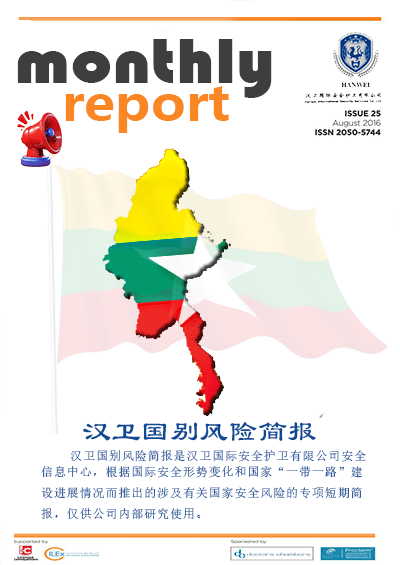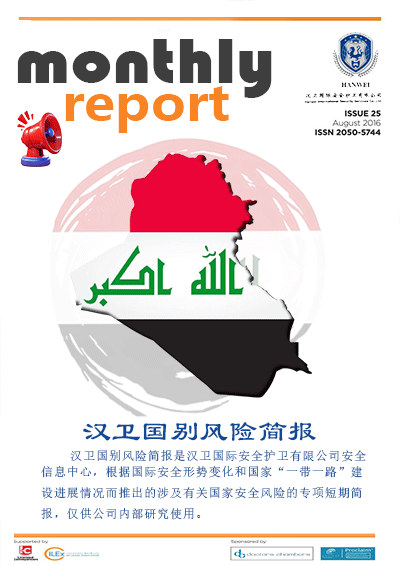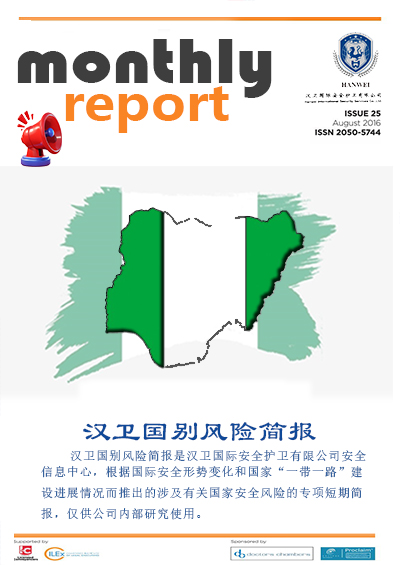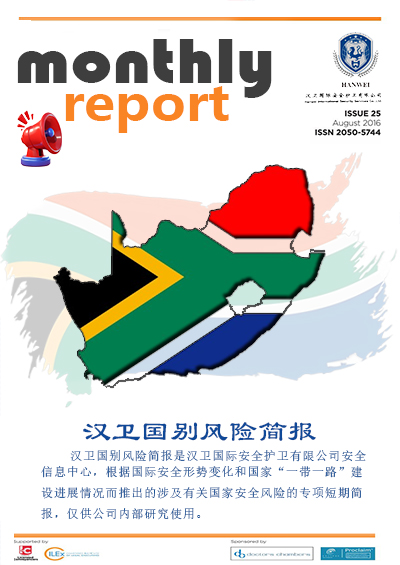South Africa Security Situation Review August 2024
According to reports from Hanwei International's security officers in South Africa and media coverage, nearly 200 representative security incidents occurred in South Africa in August (incomplete statistics), with frequent social security incidents such as fraud/extortion, theft/robbery, and kidnapping. Some incidents even escalated into serious criminal cases, threatening the lives and property of Chinese citizens and employees of Chinese enterprises in South Africa, mainly concentrated in the Western Cape, Eastern Cape, and KwaZulu-Natal provinces in the south.
Hanwei International analysis suggests that South Africa's overall security situation remains severe this month, facing multiple security challenges.South Africa's current political landscape is complex. Since the establishment of the Government of National Unity, political parties have been engaged in intense competition: The African National Congress (ANC), as the long-ruling party, dominates the unity government but still faces challenges from other parties. Meanwhile, there are disagreements among parties regarding power struggles and policy formulation. South Africa's economic turning point has arrived, but a series of "basic data" continues to unsettle the public: record-high unemployment numbers, mass protests due to prolonged wage disputes, and a severe water supply crisis have further fueled social discontent and protests. In terms of social security, violent incidents such as fraud/extortion, theft/robbery, and kidnapping remain frequent this month. With the continuous reduction of national police forces, private security plays a significant role. This report highlights representative security incidents to alert Chinese citizens in South Africa: in a country where violence has become a way of life, constant vigilance is essential.
Key developments include:
First, internal turbulence within South Africa's Government of National Unity has triggered intense power struggles and interest games.The ANC's dominant position is being challenged as the Democratic Alliance vows to become the political leader. On July 31, DA Federal Council Chair Helen Zille stated that the ANC's internal crisis would make it difficult to maintain long-term rule, and the DA should seize the opportunity to consolidate its position and become South Africa's largest political force within ten to fifteen years. The DA maintained its majority in the Western Cape elections and plans to replicate this success in Gauteng. Meanwhile, infighting continues within the unity government. On August 1, South Africa's National Council of Provinces passed a R1.1 trillion appropriation bill, drawing fierce criticism from uMkhonto weSizwe (MK) and the Economic Freedom Fighters (EFF), who strongly opposed multiple departmental budgets. The political alliance between MK, African Congress for Transformation (ACT), and EFF faces severe tests. MK is undergoing a massive purge, with 15 MPs suddenly dismissed, fueling internal discontent. Reports suggest MK Chief Whip Sihle Ngubane and Zuma's daughter Duduzile Sambudla-Zuma orchestrated this move without Zuma's knowledge. ACT has split, with 11 members joining MK, reportedly angering ACT President Mzwanele Manyi. EFF Deputy President Floyd Shivambu has reportedly resigned and been offered a senior MK position, while several key EFF members have resigned, casting uncertainty on the party's future.
Second, South Africa's economy faces challenges including water crises, unemployment, and protests.In the 2024 Medium-Term Budget Review, the National Treasury raised its three-year economic growth forecast to 1.6%, 0.2 percentage points higher than in the 2023 review. Despite leading indicators showing economic recovery, obstacles remain. South Africa is experiencing a severe water crisis comparable to Eskom's electricity crisis. Nearly two-thirds of government facilities cannot provide safe drinking water, about 40% of water infrastructure has leaks and inefficiencies, and 68% of wastewater treatment plants fail to adequately purify water, wasting and polluting vast amounts. South Africa's job market faces new challenges: unemployment has surged to 8.4 million, a record high, with the rate climbing to 33.5%. Although about 1.8 million jobs were added in the past two years, rapid labor force growth has kept unemployment rising. Despite economic recovery since 2022, growth hasn't kept pace with population growth, particularly among youth aged 15-24 (60.8% unemployment) and 25-34 (41.7%). South Africa's annual "wage war" has led to mass protests. On August 22, about 10,000 South African Municipal Workers' Union members protested on Johannesburg's M1 and M2 highways over wage disputes. Though non-violent, the protests caused major traffic disruptions, paralyzing roads and stranding commuters.
Third, private security aids South African police in maintaining social security.Over the past decade, South Africa's police force has shrunk. Poor working conditions, inadequate pay, and lack of security measures have driven experienced officers away, while inefficiency and corruption hasten departures. Budget cuts have reduced new recruits, failing to offset losses. Data shows SAPS personnel dropped from 193,297 in 2011 to 180,000 in 2023, losing over 13,000 officers and impacting security. Recent data shows violent crime rose sharply in 2022-2023, with murders up 8.6%, and armed robberies and sexual assaults increasing significantly. Meanwhile, private security has boomed, filling policing gaps and protecting businesses and communities. On July 30, SAPS and private security rescued a kidnapped 63-year-old businessman, seized R300 million in drugs, and arrested six suspects, including three Tanzanians and a German woman. Eastern Cape has seen frequent kidnappings. On August 1, East London detectives, K9 units, and private security raided a location based on intelligence, rescuing a kidnapped Chinese businessman and seizing "a shotgun, 11 boxes of ammunition, a safe, and suspected stolen goods."
South Africa's current political landscape is complex. Since the Government of National Unity's establishment, parties have engaged in intense competition: The ANC dominates but faces challenges, with disagreements over power and policies. While the economy shows signs of recovery, record unemployment, wage protests, and water crises fuel discontent. Social security remains precarious, with frequent violent incidents as police numbers dwindle and private security grows. This report highlights representative incidents to alert Chinese citizens in South Africa: in a country where violence is normalized, constant vigilance is essential. Recommendations for Chinese enterprises and individuals in South Africa include: First, monitor political news and prepare security measures. Recent infighting in the unity government over power and policies may complicate decision-making and spark public discontent. Rising unemployment, wage disputes, and utility crises could trigger protests, potentially turning violent. With fewer police and more unemployed youth, community crime may rise. Avoid political discussions in public, steer clear of crowded protests, avoid high-risk areas, don't travel alone at night, and avoid carrying large sums or cards with big balances. Second, take violent attacks seriously—safety first. Eastern Cape's frequent kidnappings, especially targeting Chinese businessmen, show kidnapping has become a major criminal revenue source. Chinese citizens should strengthen security, follow safety alerts from Chinese embassies/consulates via websites and social media, and stay informed about local security. Install surveillance, alarms, and "panic buttons" at homes and businesses, and maintain them regularly. Equip vehicles with GPS and stay alert to suspicious people/cars when driving. Private security plays a vital role against crime. Recently, South African businesses and communities face growing extortion by organized gangs demanding "protection fees" under threat of violence, targeting sectors like construction and water tankers. Chinese enterprises should assess site security risks, avoid remote high-risk areas, install alarm systems, and establish rapid response links with local security firms and police.




